

Harry Harlow. Harry Frederick Harlow (October 31, 1905 – December 6, 1981) was an American psychologist best known for his maternal-separation, dependency needs, and social isolation experiments on rhesus monkeys, which demonstrated the importance of care-giving and companionship in social and cognitive development.

He conducted most of his research at the University of Wisconsin–Madison, where humanistic psychologist Abraham Maslow worked for a time with him. Harlow's experiments were controversial; they included rearing infant macaques in isolation chambers for up to 24 months, from which they emerged severely disturbed.[1] Some researchers cite the experiments as a factor in the rise of the animal liberation movement in the United States.[2] Biography[edit] Pnas00159-0105.pdf. Nutrition and the Epigenome. GetSharedSiteSession?rc=4&redirect=http%3A%2F%2Fwww.cell. To view the full text, please login as a subscribed user or purchase a subscription.
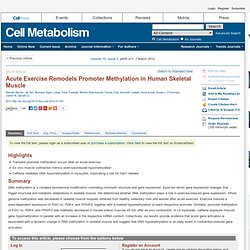
Click here to view the full text on ScienceDirect. Figure 1 Acute Exercise Remodels DNA Methylation (A) LUMA analysis of global DNA methylation. Global CpG methylation analysis of DNA extracted from muscle at baseline (REST) or 20 min after acute exercise (ACUTE EXERCISE). (B) Promoter-specific analysis of methylation levels. Impact on DNA methylation in cancer prevention and therapy by bioactive dietary components. Weaver. Epigenetics of stress adaptations in the brain. Stress Hormone Causes Epigenetic Changes - NIH Research Matters. September 27, 2010 Researchers found that chronic exposure to a stress hormone causes modifications to DNA in the brains of mice, prompting changes in gene expression.
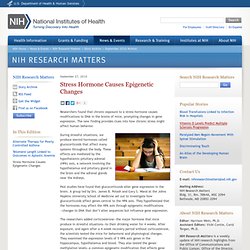
The new finding provides clues into how chronic stress might affect human behavior. During stressful situations, we produce steroid hormones called glucocorticoids that affect many systems throughout the body. These effects are mediated by the hypothalamic-pituitary-adrenal (HPA) axis, a network involving the hypothalamus and pituitary gland in the brain and the adrenal glands near the kidneys. Past studies have found that glucocorticoids alter gene expression in the brain. The researchers added corticosterone—the major hormone that mice produce in stressful situations—to their drinking water for 4 weeks. In the September 2010 issue of Endocrinology, the researchers reported that mice given corticosterone appeared more anxious during a maze test. Behavioral epigenetics. Behavioral epigenetics is the field of study examining the role of epigenetics in shaping animal (including human) behaviour.[1] It is an experimental science that seeks to explain how nurture shapes nature,[2] where nature refers to biological heredity[3] and nurture refers to virtually everything that occurs during the life-span (e.g., social-experience, diet and nutrition, and exposure to toxins).[2] Behavioral epigenetics attempts to provide a framework for understanding how the expression of genes is influenced by experiences and the environment[4] to produce individual differences in behaviour,[5] cognition[2] personality,[6] and mental health.[7][8] Background[edit] Modifications of the epigenome do not alter DNA.
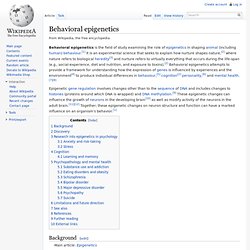
DNA methylation turns a gene "off" – it results in the inability of genetic information to be read from DNA; removing the methyl tag can turn the gene back "on".[17][18] Discovery[edit] Grandma's Experiences Leave Epigenetic Mark on Your Genes. Why can’t your friend “just get over” her upbringing by an angry, distant mother?

Why can’t she “just snap out of it”? The reason may well be due to methyl groups that were added in childhood to genes in her brain, thereby handcuffing her mood to feelings of fear and despair. Of course, it is generally not possible to sample the brains of living people. What You Eat Affects You, Your Kids and Your Grandkids. While cancer victims usually blame themselves — I shouldn't have smoked, should have eaten better, should have exercised — or the cruelty of chance, they may now have a new scapegoat: Grandma.
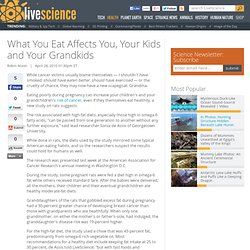
Eating poorly during pregnancy can increase your children's and your grandchildren's risk of cancer, even if they themselves eat healthily, a new study on rats suggests. The risk associated with high-fat diets, especially those high in omega-6 fatty acids, "can be passed from one generation to another without any further exposure," said lead researcher Sonia de Assis of Georgetown University. While done in rats, the diets used by the study mirrored some typical American eating habits, and so the researchers suspect the results could hold for humans as well. The research was presented last week at the American Association for Cancer Research's annual meeting in Washington D.C. During the study, some pregnant rats were fed a diet high in omega-6 fat while others received standard fare. Fat gone rogue. Your Diet Affects Your Grandchildren's DNA, Scientists Say. Epigenetics: A New Bridge between Nutrition and Health. DNA methylation DNA methylation, which modifies a cytosine base at the CpG dinucleotide residues with methyl groups, is catalyzed by Dnmt and regulates gene expression patterns by altering chromatin structures.
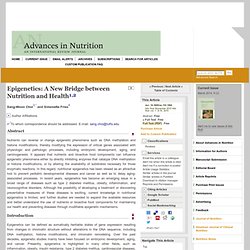
Currently, 5 different Dnmt are known: Dnmt1, Dnmt2, Dnmt 3a, Dnmt3b and DnmtL. Dnmt1 is a maintenance Dnmt and Dnmt 3a, 3b, and L are de novo Dnmt. The function of Dnmt2 is not yet clear. By affecting these Dnmt during our lifetime, nutrients and bioactive food components can change global DNA methylation, which is associated with chromosomal integrity, as well as gene-specific promoter DNA methylation, which is closely associated with gene expression.
Compared with DNA methylation reactions, the DNA demethylation process has not been well delineated. Effects of nutrients on DNA methylation. It appears that folate is essential for DNA methylation reprogramming during the early embryonic period. Epigenetics: How to alter your genes. Nutrition and the Epigenome. Epigenetic Nutrients Table.